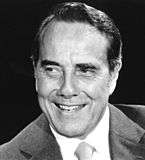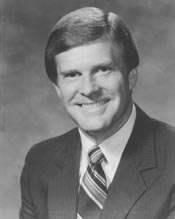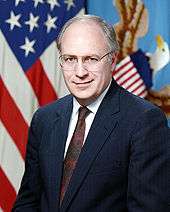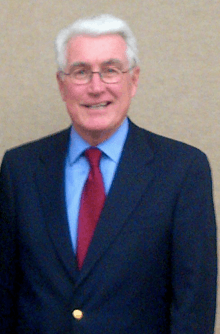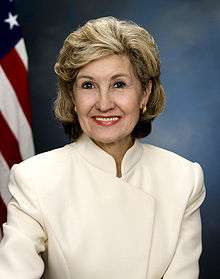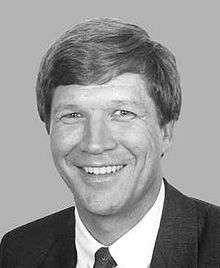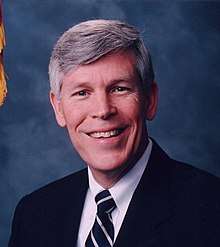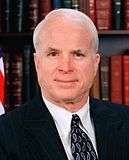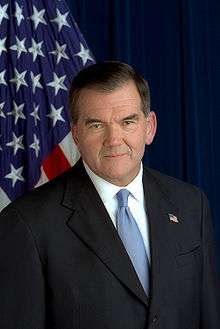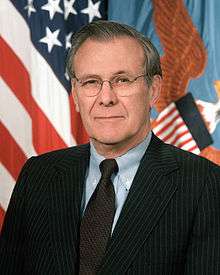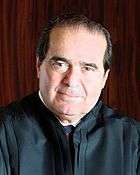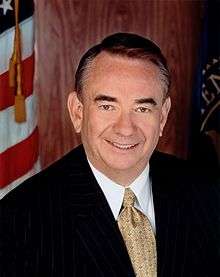1996 Republican Party presidential primaries
The 1996 Republican presidential primaries were the selection process by which voters of the Republican Party chose its nominee for President of the United States in the 1996 U.S. presidential election. Senator Bob Dole of Kansas, the former Senate Majority Leader was selected as the nominee through a series of primary elections and caucuses culminating in the 1996 Republican National Convention held from August 12 to August 15, 1996, in San Diego, California; Dole resigned from the Senate in June 1996 once he became the presumptive nominee to concentrate on his presidential campaign.
| |||||||||||||||||||||||||
| |||||||||||||||||||||||||
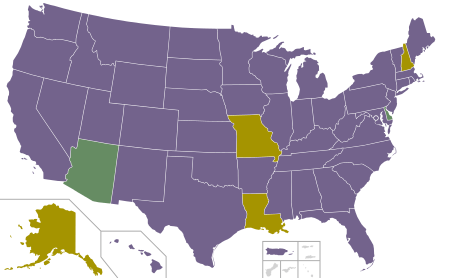 Gold denotes a state won by Pat Buchanan. Green denotes a state won by Steve Forbes. Purple denotes a state won by Bob Dole. Grey denotes a territory that did not hold a primary. | |||||||||||||||||||||||||
| |||||||||||||||||||||||||
Background
Following the 1994 midterm elections, many prominent candidates entered what would be a crowded field. This was expected as Democratic President Bill Clinton was unpopular in his first two years in office, eventually leading to the Republican Revolution. However, as Clinton became increasingly popular in his third year in office, several withdrew from the race or decided not to run. Former U.S. Army Gen. Colin L. Powell was widely courted as a potential Republican nominee. However, on November 8, 1995, Powell announced that he would not seek the nomination. Former Secretary of Defense and future Vice President of the United States Dick Cheney was touted by many as a possible candidate for the presidency, but he declared his intentions not to run in early 1995. Then-Texas Governor George W. Bush was also urged by some party leaders to seek the Republican Party nomination, but opted against doing so.
Primary race overview
Going into the 1996 primary contest, Senate Majority Leader Bob Dole was widely seen as the front runner. Dole had significant name recognition, as he was a two time presidential candidate - in 1980 and 1988, and Republican vice-presidential nominee in 1976. He was expected to win the nomination against underdog candidates such as the more conservative U.S. Senator Phil Gramm of Texas and more centrist U.S. Senator Arlen Specter of Pennsylvania. The fragmented field of candidates, which also included journalist and 1992 presidential candidate Pat Buchanan and magazine publisher Steve Forbes, debated issues such as a flat tax and other tax cut proposals, and a return to supply-side economic policies popularized by Ronald Reagan. More attention was drawn to the race by the budget stalemate in 1995 between the Congress and the President, which caused temporary shutdowns and slowdowns in many areas of federal government service.
On January 29, Buchanan won a non-binding straw poll in Alaska. Most pundits dismissed Buchanan's showing as insignificant.[1] On February 6, Buchanan won the Louisiana caucus. Buchanan and Gramm had made several trips to the state to campaign. Gramm was expected to win, due to being from neighboring Texas and having the support of many of the Louisiana party regulars.[2]
Dole won the Iowa Caucus with 26% of the vote, a considerably smaller margin of victory than was expected.
Gramm's poor showing in Louisiana plus placing 5th in Iowa's caucuses resulted in his withdrawal from the contest on the Sunday before the New Hampshire primary.
In the New Hampshire Primary, Buchanan recorded a surprising victory over Dole, who finished in second place.
Buchanan's early victories and Forbes's victories in Delaware and Arizona put Dole's expected front runner status in doubt during the formative months of the primary season. Dole won every primary after including North and South Dakota; this eventually gave him enough delegate commitments to claim status as the GOP presidential presumptive nominee.
Having collected only 21 percent of the total votes in Republican primaries and won four states, Buchanan suspended his campaign in March. He declared however that, if Dole were to choose a pro-choice running mate, he would run as the US Taxpayers Party (now Constitution Party) candidate.[3] Forbes also withdrew in March having won only two states.[4]
Dole resigned his Senate seat on June 11 in order to focus more intently on his presidential campaign.
As of 2018, this is the earliest Republican Primary in which all of the major candidates are still living.
Candidates
Withdrew during convention
- Former presidential advisor Pat Buchanan of Virginia
Withdrew during primaries
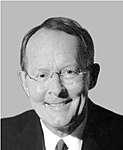
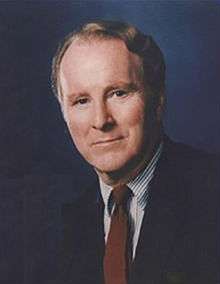 U.S. Congressman Bob Dornan of California
U.S. Congressman Bob Dornan of California Steve Forbes of New Jersey, magazine owner and publisher (March 14, 1996)
Steve Forbes of New Jersey, magazine owner and publisher (March 14, 1996).jpg) U.S. Senator Phil Gramm of Texas (February 14, 1996)
U.S. Senator Phil Gramm of Texas (February 14, 1996).jpg) Former diplomat Alan Keyes of Maryland
Former diplomat Alan Keyes of Maryland U.S. Senator Richard Lugar of Indiana (March 6, 1996)
U.S. Senator Richard Lugar of Indiana (March 6, 1996) Titan International President Morry Taylor of Michigan (March 9, 1996)
Titan International President Morry Taylor of Michigan (March 9, 1996)
Withdrew before primary elections
 U.S. Senator Arlen Specter of Pennsylvania
U.S. Senator Arlen Specter of Pennsylvania Chair of the United States Commission on Civil Rights Arthur Fletcher of Washington D.C.
Chair of the United States Commission on Civil Rights Arthur Fletcher of Washington D.C.
Other Minor Candidates
.jpg) Retired engineer Jack Fellure of West Virginia
Retired engineer Jack Fellure of West Virginia
Declined to run
- Howard Baker, former Senate Majority Leader from Tennessee
- James Baker, former Secretary of State
- Bill Bennett, former Secretary of Education
- George H.W. Bush, 41st President of the United States
- George W. Bush, Governor of Texas
- Carroll Campbell, former Governor of South Carolina
- Dick Cheney, former Secretary of Defense
- Pete du Pont, former Governor of Delaware
- John Engler, Governor of Michigan
- Newt Gingrich, Speaker of the United States House of Representatives
- Tom Kean, former Governor of New Jersey
- Lynn Morley Martin, former Secretary of Labor
- John McCain, Senator from Arizona
- Oliver North, Retired United States Marine Corps Colonel
- Colin Powell, Retired Chairman of the Joint Chiefs of Staff
- Donald Rumsfeld, former Secretary of Defense
- Dan Quayle, former Vice President
- Tommy Thompson, Governor of Wisconsin
- Bill Weld, Governor of Massachusetts
- Christine Todd Whitman, Governor of New Jersey
- Donald Trump, businessman
Results
Statewide
| Raw Vote Totals | Delegate Estimate | ||||||||||||
|---|---|---|---|---|---|---|---|---|---|---|---|---|---|
| Date | State/Terr | Dels | Alexander | Buchanan | Dole | Forbes | Others | Totals | Alexander | Buchanan | Dole | Forbes | Others |
| Jan 29 | Alaska | 20 | 53 | 2,991 | 1,569 | 2,822 | 1,806 | 9,241 | 0 | 7 | 3 | 6 | 4 |
| Feb 12 | Iowa | 25 | 17,052 | 22,578 | 25,461 | 9,861 | 21,810 | 96,762 | 4 | 6 | 7 | 2 | 6 |
| Feb 20 | New Hampshire | 16 | 47,148 | 56,874 | 54,738 | 25,505 | 24,478 | 208,743 | 4 | 4 | 4 | 2 | 2 |
| Feb 24 | Delaware | 13 | 4,375 | 6,118 | 8,909 | 10,709 | 2,662 | 32,773 | 2 | 3 | 4 | 5 | 0 |
| Feb 27 | Arizona | 38 | 24,765 | 95,742 | 102,980 | 115,962 | 8,033 | 347,482 | 0 | 12 | 12 | 14 | 0 |
| North Dakota | 20 | 4,008 | 11,653 | 26,832 | 12,455 | 8,786 | 63,734 | 0 | 4 | 9 | 4 | 3 | |
| South Dakota | 20 | 6,037 | 19,780 | 30,918 | 8,831 | 3,604 | 69,170 | 0 | 7 | 10 | 3 | 0 | |
| Mar 2 | South Carolina | 38 | 28,647 | 80,824 | 124,904 | 35,039 | 7,327 | 276,741 | 4 | 11 | 18 | 5 | 0 |
| Wyoming | 20 | 66 | 181 | 370 | 161 | 61 | 839 | 0 | 5 | 10 | 5 | 0 | |
| Mar 3 | Puerto Rico | 20 | 1,273 | 844 | 233,742 | 1,078 | 1,604 | 238,541 | 0 | 0 | 20 | 0 | 0 |
| Mar 5 | Colorado | 28 | 24,184 | 53,376 | 108,123 | 51,592 | 10,655 | 247,930 | 0 | 7 | 14 | 7 | 0 |
| Connecticut | 28 | 6,985 | 19,664 | 70,998 | 26,253 | 6,518 | 130,418 | 0 | 5 | 17 | 6 | 0 | |
| Georgia | 43 | 75,855 | 162,627 | 226,732 | 71,276 | 21,916 | 558,406 | 6 | 13 | 18 | 6 | 0 | |
| Maine | 16 | 4,450 | 16,478 | 31,147 | 9,991 | 5,214 | 67,280 | 0 | 5 | 9 | 3 | 0 | |
| Maryland | 34 | 14,061 | 53,585 | 135,522 | 32,207 | 18,871 | 254,246 | 0 | 8 | 21 | 5 | 0 | |
| Massachusetts | 40 | 21,456 | 71,688 | 135,946 | 39,605 | 16,138 | 284,833 | 0 | 12 | 22 | 6 | 0 | |
| Minnesota | 34 | 1,300 | 9,353 | 11,641 | 2,910 | 2,684 | 27,888 | 0 | 13 | 17 | 4 | 0 | |
| Rhode Island | 16 | 2,866 | 387 | 9,706 | 128 | 1,971 | 15,058 | 0 | 0 | 11 | 0 | 2 | |
| Vermont | 13 | 6,145 | 9,730 | 23,419 | 9,066 | 9,757 | 58,117 | 1 | 2 | 5 | 2 | 2 | |
| TOTALS | 2,053 | 499,719 | 3,158,475 | 8,801,010 | 1,581,617 | 897,182 | 14,938,003 | 29 | 436 | 1,265 | 177 | 52 | |
| Bob Dole | Pat Buchanan | Steve Forbes | Lamar Alexander | Alan Keyes | Richard Lugar | Phil Gramm | Morry Taylor | Bob Dornan | ||
|---|---|---|---|---|---|---|---|---|---|---|
| January 29 | Alaska (caucus) | 17% | 32% | 31% | 1% | 10% | - | 9% | - | - |
| February 6 | Louisiana (caucus) | - | 44% | - | - | 4% | - | 42% | - | - |
| February 12 | Iowa Caucus | 26% | 23% | 10% | 18% | 7% | 4% | 9% | 1% | - |
| February 20 | New Hampshire primary | 26% | 27% | 12% | 22% | 2% | 5% | - | 2% | - |
| February 24 | Delaware (primary) | 27% | 19% | 33% | 13% | 5% | 5% | 2% | - | - |
| February 27 | Arizona (primary) | 30% | 27% | 33% | 7% | 1% | 1% | - | - | - |
| February 27 | North Dakota (primary) | 42% | 18% | 20% | 6% | 3% | 1% | 9% | - | - |
| February 27 | South Dakota (primary) | 45% | 29% | 13% | 9% | 4% | - | - | - | - |
| March 2 | South Carolina (primary) | 45% | 29% | 13% | 10% | 2% | - | - | - | - |
| March 2 | Wyoming (caucus) | 40% | 18% | 17% | 7% | 7% | - | - | - | - |
| March 3 | Puerto Rico (primary) | 98% | - | - | - | - | - | - | - | - |
| March 5 | Colorado (primary) | 43% | 21% | 21% | 10% | 4% | 1% | - | - | - |
| March 5 | Connecticut (primary) | 54% | 15% | 20% | 5% | 2% | 1% | - | - | - |
| March 5 | Georgia (primary) | 41% | 29% | 13% | 14% | 3% | - | - | - | - |
| March 5 | Maine (primary) | 46% | 24% | 15% | 7% | 2% | 3% | - | - | - |
| March 5 | Maryland (primary) | 53% | 21% | 13% | 6% | 5% | 1% | - | - | - |
| March 5 | Massachusetts (primary) | 48% | 25% | 14% | 8% | 2% | 2% | - | - | - |
| March 5 | Minnesota (caucus) | 41% | 33% | 10% | 5% | 10% | - | - | - | - |
| March 5 | Rhode Island (primary) | 64% | 3% | 1% | 19% | - | 3% | - | 1% | - |
| March 5 | Vermont (primary) | 40% | 17% | 16% | 11% | - | 14% | 1% | - | - |
| March 7 | New York (primary) | 55% | 15% | 30% | - | - | - | - | - | - |
| March 9 | Missouri (caucus) | 28% | 36% | 1% | - | 9% | - | - | - | - |
| March 12 | Florida (primary) | 57% | 18% | 20% | 1% | 2% | 2% | - | - | 1% |
| March 12 | Louisiana (primary) | 48% | 33% | 12% | 2% | 3% | - | - | 1% | - |
| March 12 | Mississippi (primary) | 60% | 26% | 8% | 2% | 2% | - | - | - | 2% |
| March 12 | Oklahoma (primary) | 59% | 22% | 14% | 1% | 2% | - | - | - | - |
| March 12 | Oregon (primary) | 51% | 21% | 13% | 7% | 4% | 1% | - | - | - |
| March 12 | Tennessee (primary) | 51% | 25% | 8% | 11% | 3% | - | - | - | - |
| March 12 | Texas (primary) | 56% | 21% | 13% | 2% | 4% | - | 2% | - | - |
| March 19 | Illinois (primary) | 65% | 23% | 5% | 1% | 4% | 1% | 1% | - | - |
| March 19 | Michigan (primary) | 51% | 34% | 5% | 1% | 3% | - | - | - | - |
| March 19 | Ohio (primary) | 66% | 22% | 6% | 3% | 2% | 1% | - | - | - |
| March 19 | Wisconsin (primary) | 53% | 34% | 6% | 2% | 3% | - | - | - | - |
| March 26 | California (primary) | 66% | 18% | 7% | 2% | 4% | 1% | 1% | - | 1% |
| March 26 | Nevada (primary) | 52% | 15% | 19% | 2% | 1% | - | - | - | - |
| March 26 | Washington (primary) | 63% | 21% | 9% | 1% | 5% | - | - | - | - |
| April 23 | Pennsylvania (primary) | 64% | 18% | 8% | - | 6% | 5% | - | - | - |
| May 7 | Washington D.C. (primary) | 75% | 9% | - | - | - | - | - | - | - |
| May 7 | Indiana (primary) | 71% | 19% | 10% | - | - | - | - | - | - |
| May 7 | North Carolina (primary) | 71% | 13% | 4% | 2% | 4% | 1% | - | - | - |
| May 14 | Nebraska (primary) | 76% | 10% | 6% | 3% | 3% | - | - | - | - |
| May 14 | West Virginia (primary) | 69% | 16% | 5% | 3% | 4% | 1% | 2% | - | - |
| May 21 | Arkansas (primary) | 76% | 23% | - | - | - | - | - | - | - |
| May 28 | Idaho (primary) | 66% | 22% | - | - | 5% | - | - | - | - |
| May 28 | Kentucky (primary) | 48% | 33% | 13% | 2% | 3% | - | - | 0.63% | - |
| June 1 | Virginia (caucus) | Unknown | - | - | - | - | - | - | - | - |
| June 4 | Alabama (primary) | 76% | 16% | - | - | 3% | - | - | - | - |
| June 4 | Montana (primary) | 61% | 24% | 7% | - | - | - | - | - | - |
| June 4 | New Jersey (primary) | 82% | 11% | - | - | 7% | - | - | - | - |
| June 4 | New Mexico (primary) | 76% | 8% | 6% | 4% | 3% | - | - | - | 1% |
Nationwide
Overall popular primaries vote[6]
- Bob Dole - 9,024,742 (58.82%)
- Pat Buchanan - 3,184,943 (20.76%)
- Steve Forbes - 1,751,187 (11.41%)
- Lamar Alexander - 495,590 (3.23%)
- Alan Keyes - 471,716 (3.08%)
- Richard Lugar - 127,111 (0.83%)
- Unpledged - 123,278 (0.80%)
- Phil Gramm - 71,456 (0.47%)
- Bob Dornan - 42,140 (0.28%)
- Morry Taylor - 21,180 (0.14%)
Convention tally:
- Bob Dole 1,928
- Pat Buchanan 43
- Steve Forbes 2
- Alan Keyes 1
- Robert Bork 1
Notable endorsements
Bob Dole
- Former Senator and 1964 Presidential nominee Barry Goldwater of Arizona[7]
- Governor George W. Bush of Texas[6]
- Senator Bill Roth of Delaware[6]
- Senator Alan Simpson of Wyoming[6]
- Senator Al D'Amato of New York[6]
- Former Governor Pete du Pont of Delaware[8]
- Former Governor George Wallace of Alabama[9]
Pat Buchanan
- Governor Mike Foster of Louisiana[10]
- State Senator Dick Mountjoy of California
- Former U.S. National Security Advisor Richard Allen
- Former Governor Evan Mecham of Arizona[11]
Steve Forbes
- Former Congressman and HUD Secretary Jack Kemp of New York[6]
- Former Senator Gordon Humphrey of New Hampshire[6]
- U.S. Rep. Frank Cremeans of Ohio.
- U.S. Rep. Bob Franks of New Jersey.
Lamar Alexander
- Former Governor Tom Kean of New Jersey[6]
- Former Secretary of Education Bill Bennett[6]
Phil Gramm
- Senator John McCain of Arizona[6]
- Senator Kay Bailey Hutchison of Texas[6]
Pete Wilson
- Governor Bill Weld of Massachusetts[6]
- Perot's 1992 running-mate and retired admiral James Stockdale of Illinois[6]
Convention and VP Selection
The delegates at the Republican National Convention formally nominated Dole on August 15, 1996 as the GOP presidential candidate for the general election. Dole was the oldest first-time presidential nominee at the age of 73 years, 1 month (Ronald Reagan was 73 years, 6 months in 1984, for his second presidential nomination).
Former Congressman and Cabinet secretary Jack Kemp was nominated by acclamation as Dole's running mate the following day. Republican Party of Texas convention delegates informally nominated Alan Keyes as their preference for Vice President.
Other politicians mentioned as possible GOP V.P. nominees before Kemp was selected included:
References
- Anchorage Daily News. Jan. 31, 1996. p. 1b
- The Advocate [Baton Rouge]. Feb.7, 1996. p. A1
- Porteous, Skipp (April 1996), "Howard Phillips on Pat Buchanan", Freedom Writer, Public Eye.
- AllPolitics - Steve Forbes
- 1996 Republican Primary Election Events Timeline
- "US President – R Primaries Race – July 07, 1996". Our Campaigns.com. Retrieved 2008-03-10.
- "AZ US President – R Primary Race – Feb 27, 1996". Our Campaigns. Retrieved 2010-06-17.
- "DE US President – R Primary Race – Feb 24, 1996". Our Campaigns. Retrieved 2010-06-17.
- "Candidate – George Corley Wallace". Our Campaigns. Retrieved 2010-06-17.
- "LA US President – R Primary Race – Mar 12, 1996". Our Campaigns. Retrieved 2010-06-17.
- "Dole wins both Dakotas, but is lagging in Arizona." Toledo Blade. February 28, 1996. Accessed December 2, 2009. Final paragraph: Mr. Mecham is supporting Buchanan "all the way," and he still has an effective organization in the state.
- "Dole's VP `short list' includes McCain - Tucson Citizen Morgue, Part 2 (1993-2009)". tucsoncitizen.com. Retrieved 2018-03-31.
- "The Time I Tried To Persuade Antonin Scalia To Run For Vice President". IJR - Independent Journal Review. 2016-02-16. Retrieved 2018-03-31.
